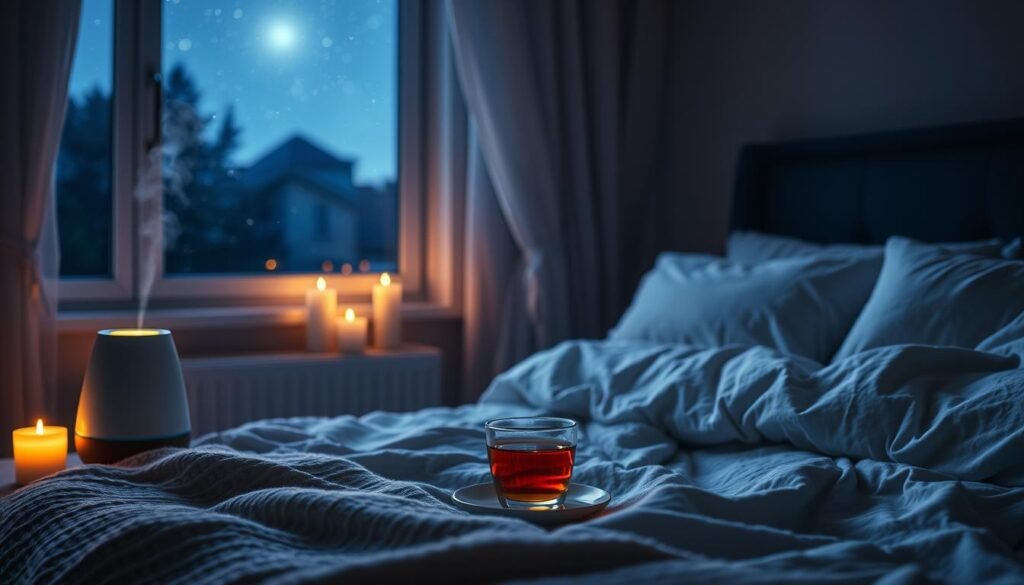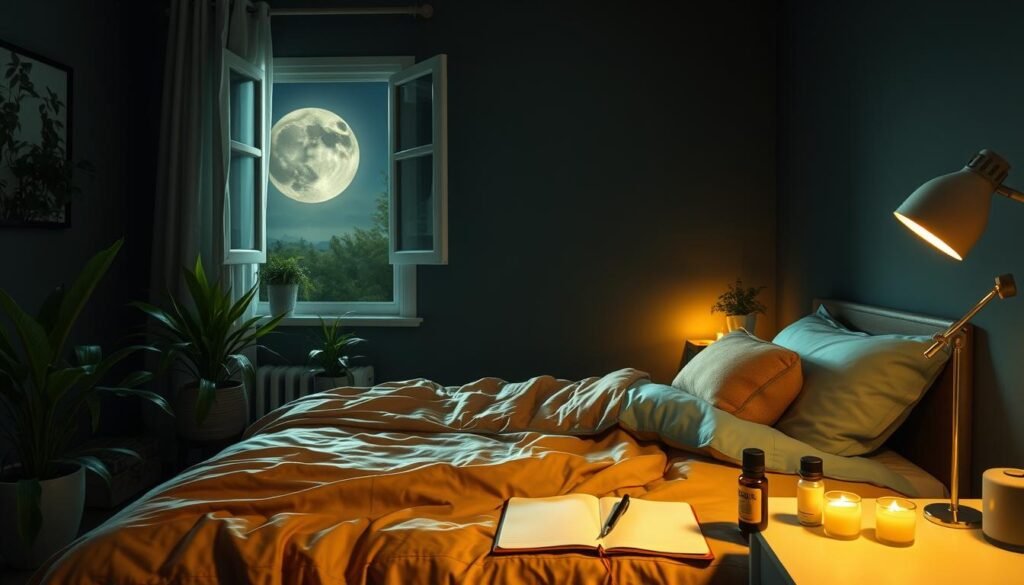Every year, 2–3% of people in the United States face panic disorder. Many deal with panic attacks at night, which harms their sleep and well-being. Knowing how to calm these attacks is key. This section offers quick tips to manage anxiety at night, aiming for peaceful sleep.
Panic attacks at night can feel very scary. But you’re not alone. There are ways to deal with them. Techniques like deep breathing, grounding, and positive thinking help a lot. Learning about what triggers your anxiety is an important first step. It helps you find peace and a good night’s sleep again.
If you want to know more about anxiety attack symptoms, check out useful info here.
Key Takeaways
- Panic disorder affects 2–3% of individuals in the United States annually.
- Nocturnal panic attacks can significantly disrupt sleep and overall health.
- Learning quick relief tips can empower individuals to manage anxiety effectively.
- Common symptoms include chest pains, shortness of breath, and racing heart.
- Effective coping with panic attacks may involve deep breathing and focusing on positive thoughts.
Understanding Nighttime Panic Attacks
Nighttime panic attacks can happen without warning, often when you’re between sleep stages. These episodes cause intense fear, making it hard to deal with anxiety at night. Symptoms like fast heartbeat, shortness of breath, and intense fear are common, just like daytime panic attacks.
About 71% of people with panic disorder might face these episodes at night. Between 18% to 45% suffer from them more than once. These attacks often happen in the first half of the night. This leads many to sleep with lights on or postpone sleep due to fear of being vulnerable when resting.
Factors like health issues, including asthma or heart problems, can spark panic attacks. These medical conditions cause symptoms that feel like anxiety. People, especially those with sleep apnea, might feel like they can’t breathe or are choking during these episodes.
Knowing what causes these attacks is key for those affected. Spotting symptoms early helps in handling them. Risks are higher for those using drugs, or too much caffeine or nicotine, as these can lead to panic attacks.
It’s crucial to acknowledge and deal with these nighttime panic attacks to better sleep and improve overall health. While many may feel alone, realizing these attacks are common helps. It encourages people to get support from medical experts.
What Causes Panic Attacks at Night?
Nighttime panic attacks come from various causes of nighttime panic attacks. A big one is underlying anxiety. It affects about 40 million adults in the U.S. That’s 18.1% of people there. Yet, only a few seek help. Not getting help can make panic attack triggers worse, leading to attacks at night.
Stressors like life changes, money worries, and health problems can trigger these episodes. Also, disrupted sleep, including nightmares, often goes hand in hand with them. Nightmares can cause panic symptoms, making you more anxious when you wake up.
Some people are more likely to have anxiety disorders because of their genes. How our personalities and brains are also matters. The unpredictable nature of night attacks can mess up sleep even more. This can start a cycle of fear of sleep that needs proper sleep anxiety treatment.
It’s key to work with a doctor for a good treatment plan. Options might include medicines or therapies like cognitive-behavioral therapy (CBT). These methods can help you face your symptoms better. They work to make panic attacks, even at night, happen less often and be less severe.
| Potential Causes | Impact on Nighttime Panic Attacks |
|---|---|
| Chronic Stress | Increases overall anxiety levels |
| Genetics | Increases risk of anxiety disorders |
| Sleep disturbances (e.g., nightmares) | Triggers physiological panic symptoms |
| Life events | Can heighten emotional responses and fears |
| Medical conditions | May contribute to increased panic likelihood |
Recognizing Symptoms of Nighttime Anxiety
Knowing the symptoms of anxiety attacks at night can make a big difference. Nighttime panic attacks can disturb your sleep, causing intense fear. This could wake you up feeling scared. Key signs include rapid heartbeat, sweating a lot, feeling like your chest is tight, and getting dizzy. It’s important to spot these signs early on.
Psychological symptoms are also a big deal. People often feel like something very bad is about to happen. Or they might feel disconnected from what’s around them. It’s crucial to recognize these feelings to deal with them better. Stress from the day can make these feelings stronger at night. This can make it hard to relax again.
Many things can trigger symptoms of anxiety attacks at night. Factors include your genes, sleep problems, and using substances like alcohol or caffeine. Knowing these triggers can help you avoid them. This can lessen the anxiety you feel at night.
Living a balanced life can lower your risk of feeling this way. Exercise regularly, eat well, and manage stress. Noticing the first signs of nighttime anxiety is powerful. It lets you get help and make big improvements in your life.
How to Calm Anxiety Attack at Night
Nighttime panic attacks can feel very intense. Luckily, there are many ways to help manage them. By learning certain techniques, you can take control back from anxiety. Techniques like deep breathing, grounding, and visualization can offer quick relief.
Practice Deep Breathing Techniques
Deep breathing is a key tool for stopping anxiety. Try breathing in deeply for four seconds and then out for eight. This can help slow your heart rate. It makes it easier to relax during a nighttime panic attack.
Engage in Grounding Techniques
The 5-4-3-2-1 grounding method is really helpful. It helps you focus on now by making you notice:
- 5 things you can see
- 4 things you can touch
- 3 things you can hear
- 2 things you can smell
- 1 thing you can taste
By doing this, you feel more stable and secure. This greatly reduces anxiety.
Use Visualization Methods
Visualization lets your mind go to a calm place. Think of a peaceful spot or a happy memory. This can switch your brain from panic to peace. It’s a great trick for managing anxiety at night.

Anxiety Relief Techniques Before Bedtime
Using good anxiety relief techniques before bed is key for better sleep. These methods ready the mind for rest, fighting off worries that bring on anxiety at night. Here, we’ll talk about a few ways people can get ready for a good night’s sleep, enhancing their health.
Establish a Consistent Sleep Routine
Having a set sleep schedule tells your body it’s time to rest. Sleeping and waking up at the same time every day keeps your internal clock in check. This leads to better sleep. It also cuts down anxiety and brings a feeling of normalcy.
Avoid Caffeine and Electronics Before Sleep
Cutting back on caffeine before bed helps lessen anxiety. Try calming activities instead to get ready for sleep. It’s also smart to avoid screens before bedtime. The blue light from screens can stop melatonin production, making sleep harder to come by.
Journaling for Mental Clarity
Journaling is a great way to deal with your thoughts and worries. Making time to jot down your feelings clears the mind. It makes it easier to unwind and sleep by creating a peaceful mental state.
Relaxation Methods for Anxiety
Learning how to relax can really help you handle stress better. Two useful ways are through meditation and progressive muscle relaxation. If you take some time every day for these, you’ll see a big improvement in managing your feelings. This can lead to feeling calmer.
Try Meditation and Mindfulness
Meditation and mindfulness are key for feeling more relaxed. They help you focus on the now and let go of stressful thoughts. Try to meditate for 10 to 20 minutes a day. Doing this regularly can make your heart rate slow down and lower your blood pressure. It helps with anxiety and makes you feel clearer and calmer every day. Adding other relaxation methods to meditation works even better. Check out a variety of techniques for the best results.
Implement Progressive Muscle Relaxation
Progressive muscle relaxation can lower your stress and make you feel relaxed. You tense up and then relax different muscles in order. This can really help with anxiety. Spend about 30 minutes on this a couple of times a day for the best effect. Adding breathing exercises, done ten times, twice a day, makes it even more effective.
After doing progressive muscle relaxation, take a moment to sit quietly with your eyes closed. This helps avoid dizziness and makes getting back to your day easier. These practices can truly change your life, especially in how you deal with anxiety.

| Relaxation Technique | Frequency of Practice | Duration per Session |
|---|---|---|
| Meditation for Anxiety Relief | Daily, 10-20 minutes | 10-20 minutes |
| Progressive Muscle Relaxation | 2-3 times daily | 30 minutes total, 10-20 seconds per muscle group |
| Controlled Breathing | Twice daily | 10 repetitions per session |
| Guided Imagery Exercise | As needed | 10-20 minutes |
Handling Panic Attacks During the Night
Panic attacks during the night, or nocturnal panic attacks, are very upsetting. Knowing how to deal with them is key to staying mentally healthy. Using good strategies can make a big difference. It can lessen the discomfort and help you bounce back.
Don’t Resist the Panic Attack
Fighting a panic attack only makes things worse. It’s better to accept it’s happening. This way, you can handle it better. Knowing that panic attacks are short-lived can help. They usually go away in five to twenty minutes, sometimes up to an hour.
Get Up and Change Your Environment
Changing where you are can help reduce the attack’s intensity. Moving to a different room can be helpful. Doing something calming like listening to soft music or drinking herbal tea can relax you further.
Focus on Positive Thoughts and Relaxation
Using relaxation methods is crucial. Practice positive affirmations or visualize something good. Focusing on positive thoughts lessens fear. It gives you a sense of control. This can help you get back to sleep, which is vital for your health.
Adding these techniques to your night routine can lead to better nights. Learning about panic and anxiety can lessen distress. It helps you understand your mental health better. For more tips on handling nighttime panic, check out expert advice here. Learn about the physical signs of anxiety here.
| Technique | Description | Benefits |
|---|---|---|
| Acceptance | Acknowledge the panic attack without resistance | Reduces anxiety, promotes calmness |
| Environment Change | Get up and move to a different room | Breaks the cycle of anxious thoughts |
| Positive Affirmations | Utilize positive self-talk | Enhances feelings of control and reduces fear |
Maintaining Long-Term Coping Strategies
Dealing with anxiety over the long haul is crucial for good mental health. A mix of life changes and habits can boost your emotional strength. This approach covers many areas of life.
Exercise is key in managing anxiety. Being active triggers endorphins, making you feel better. Walking, yoga, or swimming can help a lot over time.
What you eat also affects your mood. Omega-3 foods like salmon and some supplements reduce anxiety. Eating well helps keep your energy up and mood stable.
Good sleep is essential for mental health. A steady sleep routine and relaxation techniques improve sleep. Studies show that therapy, particularly CBT, can help solve insomnia caused by anxiety.
Having strong social ties is important too. Friends, family, or groups provide support and resilience. Being connected lowers stress and helps deal with anxiety better.
Knowing what stresses you can make coping easier. Writing down worries in a journal spots patterns in thoughts and feelings. Mindfulness meditation also helps manage anxious thoughts over time.

Seeking Professional Help for Anxiety Disorders
Getting help from a professional for anxiety disorders is key to feeling better. Therapists and counselors know how to pinpoint what causes your anxiety. They can create a plan just for you. Cognitive Behavioral Therapy (CBT) is one great way to tackle anxiety. It teaches coping strategies and helps you slowly face fears. Many see big improvements, with some feeling much better after just 5 to 8 sessions.
There are also medications that can ease anxiety symptoms. You might be given antidepressants or anti-anxiety meds like buspirone. Sometimes, doctors prescribe benzodiazepines or beta blockers. These treatments help you handle everyday stress while you’re working on deeper issues with a professional.
“Support from professionals is a vital resource for anyone struggling with anxiety disorders.”
Adding therapy for panic attacks with healthy lifestyle choices works well for anxiety management. Exercising can lower stress a lot. Eating plenty of veggies, fruits, and whole grains can also help with your mood and anxiety.
To wrap up, professional help is great for understanding and overcoming mental health challenges. It offers clear ways to get better and is key for successfully managing anxiety disorders.
| Treatment Type | Description | Effectiveness |
|---|---|---|
| Cognitive Behavioral Therapy (CBT) | Focuses on changing negative thought patterns and behaviors | High effectiveness in treating anxiety disorders |
| Medications (e.g., SSRIs, Buspirone) | Relieves symptoms through chemical balance | Varied effectiveness based on individual needs |
| Physical Activity | Promotes overall health and reduces stress | Significant positive impact on mood |
| Relaxation Techniques (e.g., meditation, yoga) | Eases anxiety and enhances well-being | Effective for stress management |
Conclusion
Exploring how to ease anxiety at night is key. Over 31% of adults in the US experience anxiety disorders in their lifetime. This can greatly affect how well they sleep. Adopting a regular sleep schedule, deep breathing, and relaxation techniques can help manage anxiety. This leads to better sleep and happier days.
Tackling the root causes and making your sleeping area calming can fight nighttime anxiety. Good sleep habits are vital. They can boost mental health by lowering the risk of anxiety attacks at night. Research shows 24% to 36% of people with sleep problems also suffer from anxiety. This shows how closely sleep and anxiety are linked.
If challenges persist, consider getting professional advice. Learning to calm anxiety at night means discovering more about yourself and effective coping methods. For further details, check out additional resources on calming anxiety attacks. Managing it well can improve your sleep and mental health. This leads to a healthier, joyful life.